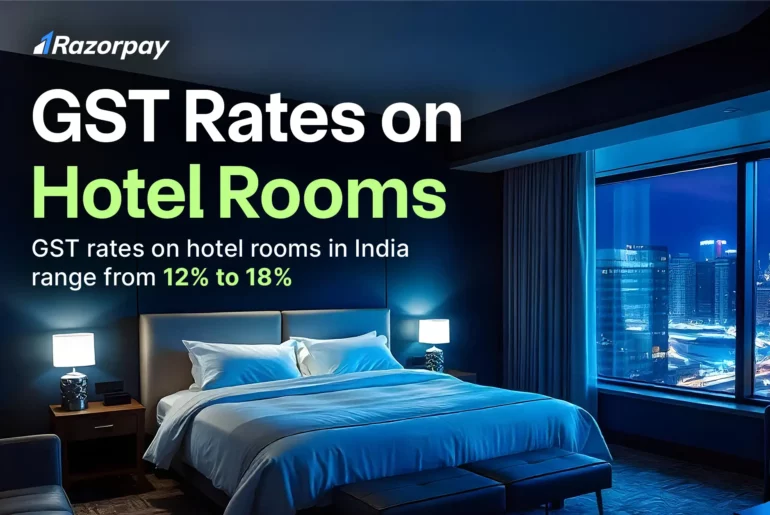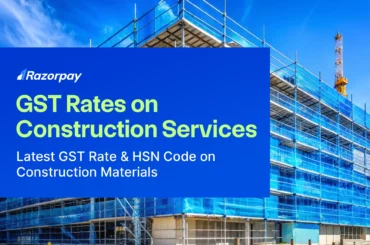Understanding the Goods and Services Tax (GST) rates applicable to hotel rooms is crucial for both travellers and hotel owners. The rate of GST on hotel rooms varies based on the room tariff. It is essential to be aware of the specific GST rates to ensure accurate billing and avoid any unnecessary charges.
This article will provide a comprehensive overview of the GST rates on hotel rooms in India, along with examples and explanations.
Table of Contents
New GST Rate on Hotel Rooms
The GST rate on hotel rooms is 12% for room tariffs up to ₹7,500 per night and 18% for room tariffs above ₹7,500 per night.
Here’s the list of hotel room rents and their new GST Rates
Hotel Room Tariff per Night |
GST Rate |
| Below ₹ 1000 | 12% |
| ₹ 1000 to ₹ 7500 | 12% |
| ₹ 2500 to ₹ 7500 | 12% |
| ₹ 7501 and Above | 18% |
Note: As per the Press Information Bureau on the 47th GST Council Meeting, the GST rate on hotel rooms up to Rs. 1000 will be 12%.
Recent Updates: 54th GST Council Meeting
GST Rate on Hotel Rooms: Pre-GST vs Post GST
Before the implementation of GST, hotel rooms were subject to a complex patchwork of taxes, including Value Added Tax (VAT), service tax, luxury tax, and in some cases, entry tax. These taxes varied across different states, leading to inconsistencies and complexities for both hotels and travellers.The introduction of GST in 2017 streamlined the taxation process by replacing these multiple taxes with a single, uniform rate.
For Example, Let’s consider a hotel room with a tariff of Rs. 10,000 per night in Bengaluru, Karnataka.
Category |
Pre-GST |
Post-GST |
| Room Tariff | ₹10,000 | ₹10,000 |
| Service Tax (10%) | ₹1,000 | N/A |
| Luxury Tax (15%) | ₹1,500 | N/A |
| GST (18%) | N/A | ₹1,800 |
| Total Tax | ₹2,500 | ₹1,800 |
| Total Payable Amount | ₹12,500 | ₹11,800 |
GST Calculation on Hotel Rooms with Example
Let’s consider Shriyam’s hotel stay in Bengaluru. She booked a room for Rs. 10,000 per night and opted for additional meal and spa services.
Here’s a breakdown of the costs and GST calculations:
Component |
Cost in INR |
GST Rate (%) |
GST Amount in INR |
| Room Tariff (2 nights) | ₹ 20,000 | 18% | ₹ 3,600 |
| Meals (Food & Beverages) | ₹ 3,000 | 12% | ₹ 360 |
| Spa Service | ₹ 2,000 | 18% | ₹ 360 |
Total Package Price: Rs. 25,000
Total GST: Rs. 4,320
Final Amount Payable: Rs. 29,320 (25,000 + 4,320)
Determining GST Rate: Declared Tariff vs. Invoice Amount
- The applicable GST rate for hotel accommodations is based on the declared tariff or the actual invoice amount.
- The declared tariff represents the standard room rate published by the hotel, excluding any promotional discounts.
- Even if a discount is applied, the GST rate is determined by the original declared tariff, especially if it places the room in a higher tax bracket.
- GST is calculated based on the declared tariff at the time of booking, regardless of any subsequent price reductions.
- Additional in-room services, such as dining or beverages, may be subject to separate GST rates.
GST Rate on Hotel Cancellation
GST on hotel cancellations will be applied at the same rate as the GST on hotel rooms. For example, if you’re paying 12% as GST on hotel room rent, you’ll be paying 12% GST on the cancellation of the hotel booking.
This is done to meet compliance requirements and to ensure that the government has a steady flow of revenue from the tourism industry.
Input Tax Credit for GST on Hotel Rooms
Hotels can claim ITC on the GST paid on various inputs used in their operations, including:
- Construction materials for building or renovating their properties
- Furnishings and equipment
- Food and beverages served to guests
- Utilities such as electricity, water, and gas
- Salaries and wages of employees involved in hotel operations
How is GST on Hotels Rooms is Calculated for Bundled Packages?
A hotel bundled package typically includes multiple services, such as:
- Accommodation
- Meals
- Spa treatments
- Other amenities
Each component of a bundled package is taxed according to its predetermined GST rate. Hotel rooms are typically taxed at 12% to 18%, varying based on the room tariff. Food and beverage services, including GST on food, often have different GST rates, which may be higher or lower than the hotel room rate. Spa services are generally taxed at 18%, while other amenities can fall into any of the four GST slabs: 5%, 12%, 18%, or 28%.
Conditions for Claiming ITC for GST on Hotels
To claim Input Tax Credit (ITC) for GST on hotel rooms and related services, hotels must ensure that the following conditions are met:
1. Registration under GST
The hotel must be registered under the Goods and Services Tax (GST) regime.
2. Valid Tax Invoice
The hotel must possess a valid tax invoice for the goods or services purchased, which includes:
-
- Invoice number
- Date of issue
- Name and address of the supplier and recipient
- Description of goods or services
- GSTIN of the supplier
- Rate of tax and total tax amount
3. Business Use
The goods or services purchased must be used for business purposes related to the hotel’s operations.
4. Timely Claim
The ITC must be claimed within the prescribed time limit (generally, the due date for filing the GSTR-3B return for the relevant period).
5. Matching of Invoices
The ITC can only be claimed if the corresponding output tax liability has been declared in the GSTR-3B return.
6. No Ineligibility
The ITC cannot be claimed for goods or services that are exempt from GST or ineligible for ITC under the GST rules.
7. Reverse Charge Mechanism
If the hotel is liable to pay GST under the reverse charge mechanism, it can claim ITC on the GST paid on the supplies received.
8. Composite Supply
For composite supplies (a combination of goods and services), ITC can be claimed on the portion of the supply that is taxable.
9. Specific Exemptions and Restrictions
There may be specific exemptions or restrictions on claiming ITC for certain types of goods or services used by hotels.
Impact of GST on Hotel Rooms and the Hospitality Industry
The implementation of GST on hotel rooms had the following effect on the hospitality industry:
1. Price Changes
GST has led to higher hotel room prices, especially for accommodations over ₹7,500 per night, due to an 18% tax rate replacing various state and central taxes.
However, some travellers may enjoy reduced hotel room prices if their room falls under the 12% tax bracket, making the overall tax liability lesser than what it would have been under the pre-GST regime.
2. Compliance and Efficiency
GST has simplified the tax system for hotels by consolidating multiple taxes into one, making compliance easier and improving operational efficiency.
3. Impact on Small Hotels
The small hotel sector has faced increased pressure to formalize operations under GST, leading to greater scrutiny and compliance challenges. However, the government has provided some relief for very small hotels.
Those with annual revenues below the taxable threshold of Rs. 20 lakh remain exempt from GST, easing their tax burden and allowing them to operate without the complexities of GST compliance.
4. Benefits for Consumers
Consumers benefit from GST through clearer pricing and reduced tax complexity, potentially leading to more transparent and consistent rates.
5. Impact on Tourism
GST on hotel rooms has positively impacted tourism by standardizing tax rates, which enhances pricing transparency and makes India a more attractive destination for travellers.
Frequently Asked Questions (FAQs)
1. Are there any exemptions from GST for hotel rooms?
There are no broad exemptions for GST on hotel rooms. However, very small hotel operators with annual revenue below Rs 20 lakh will remain exempt from GST.
2. Are homestays and guesthouses subject to GST?
Yes, homestays and guesthouses are subject to a GST rate of 12% to 18%. The applicable rate depends on the room tariff. For rooms priced up to ₹7,500 per night, the GST rate is 12%. For those priced above ₹7,501, the rate is 18%.
3. Does the GST rate on hotel rooms vary by state?
No, the GST on hotel rooms is uniform across India. It does not vary by state, though states may have different rates for other services and taxes.
4. Is GST applicable on food and other services provided by hotels?
Yes, GST is applicable on food and other services provided by hotels. The GST on food and beverages is typically 5% or 18%, depending on whether it’s served in a restaurant or as part of a package.
5. Is GST applicable on room rent above ₹5,000?
Yes, GST on room rent above ₹5,000 per night attracts a GST rate of 12%.
6. What is the GST rate on hotel room rent below 1000?
The GST rate on hotel room rent below 1000 is subject to a 12% GST.


